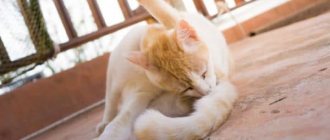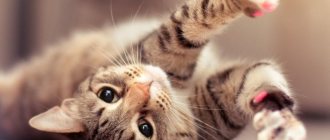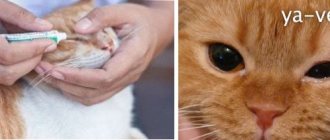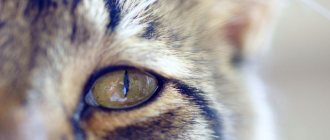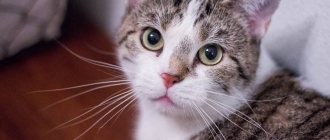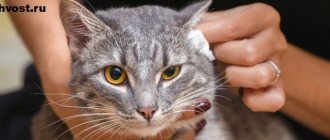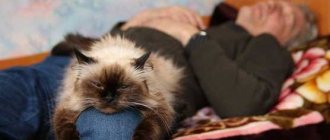The cat rides on its butt: reason No. 1 - worms
Most often, the reason that your pet rides on its butt is worms, which periodically crawl out of the anus and irritate it. Technically, the reason for your pet's behavior is itching. So the cat is trying to rub against the carpet to relieve this itch. In this case, let your veterinarian select an anthelmintic drug and the correct dosage for you. As a result, your carpets will be clean.
Article continues after advertisement
If, after deworming, the situation repeats, this means that the wrong types of worms that are tormenting your pet were expelled, or the reason is not worms.
Gretta: “We had something similar. But then we didn’t even think about worms, but it turned out that they were infectious. We were treated with Drontal, it helped perfectly, we completely forgot about gender, we remembered what a normal cat’s life is like, curled up in a ball on the owner’s bed.”
Possible pathological disorders
Unfortunately, diarrhea and dirty fur are not the only factors that cause a cat to ride on its butt. There are also more serious factors that lead to this behavior, for example:
- mental health disorder;
- post-traumatic stress disorder;
- helminthic infestation;
- paraanal inflammation.
Each of the diseases deserves attention and requires consultation with a veterinarian. In addition, they are accompanied by other symptoms, in addition to “travels on the fifth point”.
The cat rides on his butt: reason No. 2 - he wipes it
Does your cat wipe its butt on the floor after using the toilet? The reason for this behavior can be laughably banal. After using the toilet, the cat has feces left on its butt or tail, which the pet tries to get rid of in such a simple way. Typically, cats choose rough surfaces such as the carpet or sofa for wiping. But they can also choose linoleum. Oddly enough, this behavior is characteristic of squeamish cats who, after their dirty deeds, do not really like to lick their lips below the waist.
Good news. Even though the problem is more behavioral, there is still a solution. Ideally, shit should not stick to the butt, because normal feces are formed and come out easily, leaving no traces. If this is not the case, then the diet is not entirely correct and needs to be adjusted. For example, perhaps you are giving your cat something that makes him weak. Or vice versa. Analyze the situation and consult a veterinarian.
If the reason is long hair and not diet, you will have to trim your cat's pants.
You can force a cat to lick its butt after using the toilet by dripping vegetable oil onto the anus, preferably one that the cat likes. You can also use fish oil. Within a few minutes after you do this, the cat’s butt will become licked and fragrant. Over time, the cat itself will learn to lick itself after using the toilet, rather than wiping itself on clean carpets.
Elena: “One day my kitty, having gone to the toilet for a long time, suddenly somehow strangely began to come out of the tray. At first she crawled out of it very hard, practically without using her hind legs. The noise was terrible. The fact is that we have a tray with a side and just like that, only on the front paws, it’s difficult to “leave” from there. Well, then she began to ride on the floor on her ass, after a while moving onto the carpet. I was laughing and screaming at the same time for her to stop. It turned out that the cat had shit stuck to her butt. My kitty, by the way, can’t stand washing THERE. The next day, the stool was also slightly relaxed and the action was repeated. Then we adjusted the diet - and there was no such whinnying anymore.”
Why does a cat roll on the floor on its back?
Riding on its back is considered normal for a cat if it enjoys it. You should be wary when an animal does this constantly or rubs too much on the floor.
Most of the reasons that make your pet want to lie on its back are completely harmless, but you may encounter a problem that requires treatment.
Physiological needs of a cat
The most common reasons why a cat rolls on its back are:
- 1. The desire to scratch your back.
The animal is not able to reach its back with its paws, so it has to periodically lie on its back to scratch itself. - 2. Manifestation of instincts or just a game.
In the cat family, unlike dogs, the dominant one in the pair falls on his back. From the outside it may seem that he is defeated, but in fact this is how the animal gets the opportunity to inflict a strong blow on the enemy with its hind legs. When a cat is playing and rolling on the floor on its back, you should not reach out to it, it will take it as a challenge and attack. Even if the pet is just playing, sharp claws can seriously hurt, so at such moments you need to be careful around the animal. - 3. Sexual hunting.
If the animal does not have breeding value, experts recommend sterilization. This is due to the torment that the pet experiences every time due to strong hormonal changes, and with a high risk of diseases of the genitourinary system. It has been proven that sterilized cats live up to 3 years longer than those who regularly go into estrus, that is, do not become pregnant at the right time. - 4. Relaxation and stress management.
Some cats behave this way to calm down and may roll on their back after a slight fright or mild stress, getting rid of it in this way. This is considered normal if the pet does not experience significant discomfort and is not tense. - 5. Foreign odor that the animal tries to eliminate with its own.
Then the cat rubs its back not only against the floor, but also against various things and objects. As soon as the pet becomes satisfied with the result of its actions, it loses interest in this activity.
If your cat's piggyback ride is related to one of these options, there is nothing to worry about. This behavior does not require intervention, much less treatment. An exception can be considered sterilization, but this is not a mandatory method, but a recommendation from specialists. This way it will be calmer for all household members and the cat itself, because even if the animal does not meow loudly, it suffers.
- 2. Felted fur causes a lot of inconvenience to the animal.
Long-haired cat breeds suffer from this constantly, so regular brushing is essential. But pets with short hair do not always cope on their own, especially in the back area. To solve the problem, just choose the most suitable comb and regularly remove excess hair. With this care, the cat will swallow less hair, which will have a positive effect on its digestive system. - 3. Infections with various forms of fungi can cause itching and rolling on the back.
It is impossible to find out which type of infection has affected the animal without tests, so self-treatment in this case is unacceptable. Depending on the degree of development of the disease, local therapy or complex treatment is selected. The risk of fungal infection is high, even if the pet does not leave the house.
Each of the possible causes requires timely intervention in order to relieve the animal from discomfort as quickly as possible. If treatment is necessary, consultation with a veterinarian is mandatory. It is almost impossible to choose the most effective drug for a cat at home, and treatment at random often causes various complications.
A cat rolls its butt on the carpet or floor: the reasons why it rolls on its butt after using the toilet, why it wipes it in this way, how to stop it from rubbing like this.
Every cat owner sooner or later encounters an incredible scene.
: his beloved gentle cat, coming out of the toilet, sits on her butt and begins to quickly move her front paws, moving herself in a straight line. There may be a dark strip behind it on the linoleum, although, naturally, nothing will be noticeable on the carpet. She may finish walking on the floor after half a meter, or she may rub longer and even repeat several times.
This behavior looks funny, but why do cats do this?
? The main reason is the presence of an external or internal stimulus.
Most common irritants
:
The cat rides on its butt: reason No. 3 - clogged glands
Cats have so-called paraanal glands near the anus. These are very necessary glands that help cats leave their scent on objects and thus mark their territory. However, sometimes the glands become clogged, which can cause discomfort. Then the cat tries to clean them on his own by riding on the floor.
Anal glands (paraanal glands) are derivatives of the sweat and sebaceous glands in mammals. Open into the cavity of the hindgut or near the anus. They secrete an odorous liquid (secret). They are used by animals to recognize each other (intraspecific identification), attract partners, scare away enemies (serve as a repellent), and also to mark territory.
You should contact your veterinarian to have the glands checked and cleaned. This procedure is simple and inexpensive, but very important. The main thing is that the veterinarian only does this if they are truly clogged. After cleaning, it is necessary to find out the reason why the glands are clogged. Because otherwise cleaning will not solve the problem forever.
Article continues after advertisement
The reason may lie in a metabolic disorder in the cat’s body, as a result of which the secretion has become too thick. The veterinarian must identify the cause and eliminate it. For example, metabolic disorders often occur in breeds prone to obesity and physical inactivity. This includes, among other things, the Scots and the British. So keep an eye on your pet's weight.
Also, the cause of blocked anal glands may be that your cat has too loose stools. The fact is that the glands are cleaned mechanically by pressing feces on them as they exit the rectum. But for this, the masses must be formed and solid. If they are too soft, then the glands are not cleansed. In this case, you will simply have to adjust your pet’s diet.
Ideally, you should examine your pet's anus every few months, or ask your veterinarian to do so. But we do not recommend cleaning the anal glands on your own for beginners. First of all, it's unpleasant. Secondly, you might damage something. Thirdly, the pet can break free and behave inappropriately, injuring you. Fourthly, the secret stinks, and due to your lack of skill you may be “lucky” to stain yourself and everything around you. The secret can shoot, for example, in the face. However, the skill of cleaning the glands is not difficult: it can be learned if you set such a goal.
If you do not pay attention to the clogged anal glands and start the process, inflammation will begin, as a result of which treatment will require not only cleaning the glands, but also taking antibiotics or even undergoing surgery.
Tangles
Long-haired dog breeds may experience discomfort when matted hair gets into sensitive areas under the tail and begins to itch on the floor or furnishings.
After examining your pet, you can make sure that this is the reason, after which you can trim it and remove all hairballs.
Did you know?
In the Aztec Empire, Chihuahua dogs were raised as food for predators in captivity.
Funny-looking behavior of a pet can signal completely unfunny health problems, ranging from blockage of the anal glands to intestinal prolapse. If you notice this behavior, you should immediately show your dog to a doctor. In any case, this will be useful, even if the alarm turns out to be false.
The article focuses on issues related to one of the most famous problems these days, which almost all pet lovers face.
Why does a kitten ride on its butt after using the toilet and how to help at home
The reason for such strange behavior in a kitten as “riding” on its butt may be the presence of worms in the pet. As soon as he goes to the toilet, the worms begin to move, creating itching or tickling in the anus area. To remove worms, you can use a special product that is sold in a veterinary pharmacy.
The kitten rides on its butt, what does this mean if there are no worms?
If a kitten rides on its butt, it is often due to worms. However, if there are no worms in the kitten’s body, then the cause may be blockage of the paraanal glands near the anus. In a healthy kitten, the glands clean themselves during bowel movements.
If some kind of malfunction occurs in the body, the glands stop being cleaned and become inflamed, releasing an unpleasant-smelling substance. Then you need to either clean it yourself or take it to the vet.
Why does a kitten rub its butt on the carpet? Reasons and what to do
When a kitten rubs its butt on the carpet, you should immediately investigate the problem for several reasons.
By scratching the butt on the carpet, the pet will leave worm eggs, which can then land on a person or on the hands of a child, and then cause an infection.
To rid your kitten of the disease, you should contact a veterinarian or remove the worms yourself using special medications.
A fairly common problem with which owners of furry pets turn to the veterinarian is a sudden change in the animal’s behavior. If your cat suddenly begins to scratch under its tail, tries to wipe its anus on the carpet, or otherwise becomes restless, you should carefully examine the affected area.
Long-haired cats may experience discomfort after defecation. If feces remains in the fur under the tail, clean animals will try their best to get rid of it. This usually manifests itself in the cat scratching its butt on the carpet after going to the toilet. This phenomenon is absolutely normal; in the wild, cats use grass and fallen leaves for this purpose.
However, the problem must be dealt with, as the cat can stain carpets, bedding or floors. Owners of long-haired animals have two options - either wash the cat's butt after using the toilet, or cut off the long hair under the tail. The first option is difficult to implement, since it is not always possible to catch the moment of the pet’s natural needs. The best way out of this situation would be to carefully trim the fur so that no pieces of feces remain in it or sand from the cat's litter box gets in.
The cat rides on his butt: reason No. 4 - he swallowed something
If your cat rides on his butt, this is in any case a reason to look under his tail. Perhaps he is trying to get rid of something that just can't come out. For example, from thread, rain or polyethylene. If this is the case and the foreign object is sticking out of the butt, very carefully remove it. But if it's Christmas tree rain, it can damage the intestines like a blade. Therefore, the rain cannot be delayed, you can only cut it off and wait until the next portion comes out on its own.
After removing the foreign object, monitor the cat's stool: if there is blood in it, this is a reason to contact the veterinarian, because blood may indicate internal bleeding.
Ambassador: “One morning my fat man started riding on his butt. (I have short hair, and the undertail is kind of neat, it doesn’t get dirty.) I’m shocked. Well, I think it's fucked up. Worms. Then the cat stood up, and there was something long sticking out of his ass!!!!! I'm totally panicking!! I take a glove, well, I think I’ll pull out the asshole worm. Not so. The cat screamed and ran away... Then he comes back happy. I look: there is nothing. I go out into the kitchen and see “IT” on the floor. I approach carefully, look... and this is an ordinary thread!!!!!! My friend ate the curtains and ate the thread.”
How to recognize cat butt disease
Helminthic infestations in an animal are not detected immediately, but over time they begin to manifest themselves in the form of:
- refusal to eat or excessive appetite;
- disorders of the gastrointestinal tract, frequent constipation, diarrhea, vomiting;
- cough, which can be caused by roundworms;
- small rash on the butt and scabies around the anus;
- purulent discharge in the mucous membrane;
- blood spots in the stool.
Why does a puppy hiccup after eating: reasons and what to do
The infected animal becomes lethargic, constantly sleeps, has anemia, an enlarged liver, and yellowness of the whites of the eyes due to clogged bile ducts. The coat becomes faded, loses its silkiness, and falls out. A pregnant cat may have a miscarriage. Kittens are slow in growth, their bellies are enlarged, like those with rickets.
Note! These symptoms are similar in appearance to colds. If you do not understand the cause and do deworming, you can cause irreparable harm to your pet, even death. Therefore, before doing anything, you need to get tested at a veterinary clinic for the presence of parasites.
A sick cat can be identified by external symptoms
In the future, you need to adhere to the recommendations of doctors and strictly follow the instructions included with the drug. Parasites spread very quickly, and untimely treatment can have disastrous consequences.
Before deworming, furry pets must be free of fleas, otherwise the treatment will not have the desired effect. To ensure that the cat swallows the medicine completely, the tablet is crushed and mixed with minced meat or pate. You can dissolve the anti-parasite remedy in water and inject it into the infected animal’s cheek with a syringe without a needle.
Before deworming, you need to rid your pet of fleas.
You can use your fingers or a special device (piller) to place the tablet on the root of the cat's tongue. At the same time, care should be taken to ensure that the animal does not spit out the medicine. To do this, it is recommended to keep the cat's mouth closed and stroke the throat, stimulating swallowing. An abundance of saliva is a normal reaction to the process.
Since the drugs kill adult parasites, and new parasites emerge from the eggs over time, deworming is repeated after 2 weeks. It is preferable to carry out the destruction of parasites on weekends. This is done in case the pet may need help from the owner during the procedure, for example, giving the pet a laxative in case of constipation.
Deworming is a mandatory procedure before each pet vaccination. An animal's body, cleared of parasites, tolerates vaccination more easily and is rarely susceptible to side effects.
Important! You cannot poison cats expecting offspring or nursing kittens, weakened, sick, or old animals with parasites. You should strictly adhere to the instructions regarding the age of the kittens indicated on the drug.
After the procedure for eliminating parasites has been completed, you should be especially careful when washing your cat's litter box. A poorly washed pot with eggs and larvae of worms can reinfect the animal with parasites. It will be enough for him to lick his paws, and deworming will go down the drain.
The cat rides on its butt: reason No. 5 - it attracts attention
Butt riding can be purely a behavioral problem. If this is not the first time your cat has done this and once upon a time he really had objective problems, and you ran around his butt as if stung, then perhaps in this way the cat is now attracting attention to himself. This means that the cat really needs communication, which you are not giving it. In this case, pet the cat and talk to him. Do this regularly. If after that he stopped driving in fifth place, then the reason was most likely a lack of attention.
Poor diet and low mobility
Common factors leading to butt riding include:
- physical inactivity;
- excess body weight;
- high-calorie foods.
Unfortunately, even among cats there are often lazy people who lead a sedentary lifestyle. With obesity and low activity, changes occur in the animal’s body and the place of muscles is replaced by a fat layer. The tissues are compressed and the circulation of the anal ducts is disrupted.
Read also: How to spell the word “lowland” correctly?
Excess calories affect the functions of internal organs, which leads to the development of diarrhea. With frequent bowel movements, the odorous secretion does not mix with feces, remaining on the skin, causing irritation and itching. And in this case, the pet will ride on the floor, trying to reduce discomfort.
The cat rides on his butt: reason No. 6 - he has allergies
Rarely, the cause of this cat behavior may be an allergy to food or something else. As a result, the cat may develop irritation in the anus, which he will try to scratch on the floor. In this case, you will need to introduce anti-inflammatory suppositories (on the advice of a veterinarian) and eliminate the allergen from the apartment.
Most often, the allergen is found in food. In this case, it will not be difficult to identify it. Just keep in mind that if you do this experimentally, it will take quite a long time to carry out the experiment, because... manifestations of allergies do not disappear until the body completely removes the allergen (including from the bloodstream), and this takes from several days to 2 weeks. That is, it will be necessary to spend at least a week testing each suspicious product.
Rate and share!
Complication of labor
First-born cats, having no experience of how to behave when a kitten gets stuck in the birth canal during pushing, sit on their tail and ride along the floor, trying to help, as with defecation. Experienced cats encourage the kitten to be born by massaging their belly with their tongue. Without the help of the owner or veterinarian, childbirth in an inexperienced cat will end in the death of not only the kitten, but also the cat itself.
Previous
Question and answer 6 reasons why cats piss in corners - how to wean them off
Next
Questions and answers How to stop a cat from tearing up wallpaper - weaning methods
Great article
Inflammatory infection
If your cat has a viral, bacterial or fungal infection, a swollen and red butt may be one of the symptoms. The types of these infections are incredibly varied, but they can be systemic or local.
With local infections, the cat may have a bacterial infection. If your cat's anus is injured due to strain or any other physical trauma affecting the area, bacteria will likely enter the wound. This often occurs through cat feces. Bacteria causing the infection can cause inflammation. If the infection is severe enough, your cat will need antibiotic treatment.
Typically, treatment will depend on the cause. In rare cases, antiviral drugs may be used for viral infections. Most often, treatment requires symptom relief until the body recovers.
© shutterstock


